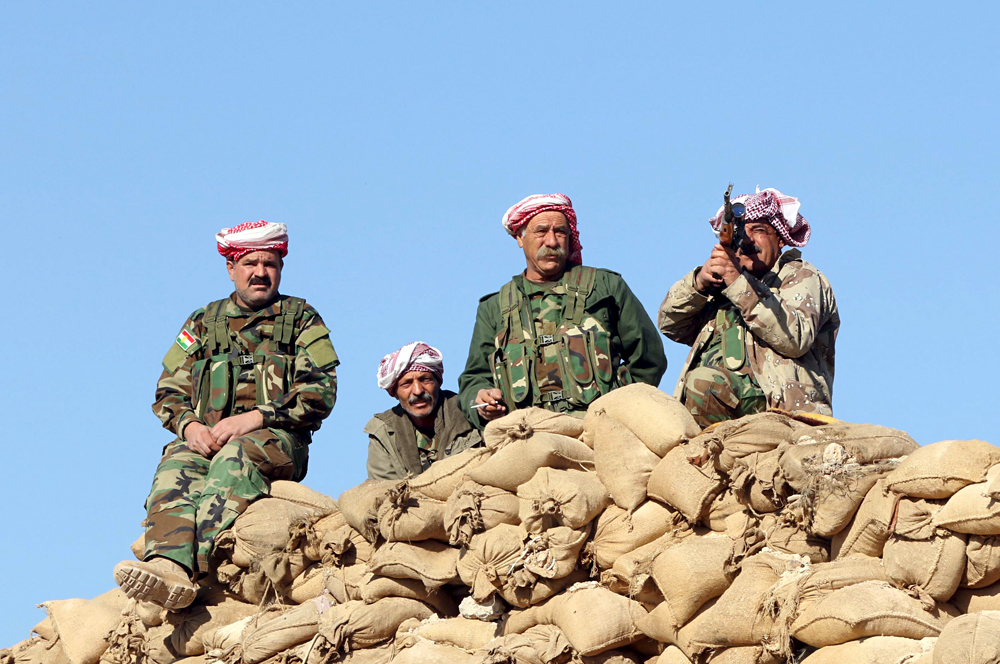
Members of the Kurdish peshmerga forces gather in the town of Sinjar, Iraq, Nov. 13, 2015.
ReutersThe first batch of Russian weapons for the fighters of the Kurdish paramilitary Peshmerga militia, who are fighting Islamic State (ISIS) forces in the region, has arrived in Iraq.
Senior Russian diplomats passed five 23mm ZU-23-2 anti-aircraft autoguns to resistance forces.
The ZU-23-2 is a Soviet 23-mm anti-aircraft twin-barreled autocannon:
Rate of fire: 2,000 rounds per minute;
Weight: 950 kg (2,090 lb);
Projectile weight: 190 g (6.7 ounces);
Effective firing range: height: 1.5 km (5,000 feet);
Distance: 2.5 km (1.55 miles)
Crew: five people Adopted by the USSR on March 22, 1960
"The first batch of weapons came on March 14 and was intended for the Peshmerga militias of Iraqi Kurdistan," the RIA Novosti news agency quoted Artyom Grigoryan, attaché of the Russian Consulate General in the Iraqi town of Erbil, as saying.
"The weapons were handed over in the presence of the ambassador [of Russia in Iraq – RBTH] and the Consul General [of Russia – RBTH] as well as the Deputy Chief of the Peshmerga Staff."
According to Grigoryan, the parties discussed further arms supplies.
"After the transfer of the arms shipment, the Russian ambassador said that this is not the last batch of weapons," he said.
"He said that Russia hopes that, with this weapon, Peshmerga and Iraqi forces will defeat ISIS."
As he noted, weapons are being supplied to the Iraqi Kurdistan armed forces in coordination with Baghdad.
"Russia has decided to change its Middle East policy and state it openly," Fyodor Lukyanov, chief editor of the Russia in Global Affairs magazine, told RBTH, commenting on the developments in Iraq.
"In terms of the content of cooperation, intelligence services in Europe and the Middle East knew about our interaction with the Kurds long before the official announcement. There is nothing wrong in cooperation with the forces fighting against Islamic State."
As Lukyanov noted, Russia is saying with this move that it has extensive connections and interests in the Middle East.
"Moscow has also stressed that today the Kurdish community is becoming an important, visible and active part of the Middle East process to be reckoned with," he said.
According to Vladimir Yevseyev, head of the Eurasian Integration and SCO Development Department of the CIS Countries Institute, Russia decided to openly announce the start of the supply of arms to the Iraqi Kurds after the visit of Russian Deputy Prime Minister Dmitry Rogozin to Baghdad.
During these negotiations, the parties discussed arms supplies and to Peshmerga to fight ISIS terrorists, among other things.
"Arms supplies to Iraqi Kurds have long been known," Yevseyev told RBTH.
"In addition to Russia, they have been sent by the United States, Germany and Iran. The countries have agreements about these supplies – what can be supplied for the fighting against ISIS, and what cannot."
He noted that transportation is carried out with the consent of the Iraqi leadership. The weapons include not only anti-aircraft guns, but also grenade launchers.
"We do not supply the Kurds with portable anti-aircraft missiles or heavy weapons, which requires additional training. It is entirely possible that we will start to supply light armored vehicles. No more," Yevseyev added.
All rights reserved by Rossiyskaya Gazeta.
Subscribe
to our newsletter!
Get the week's best stories straight to your inbox